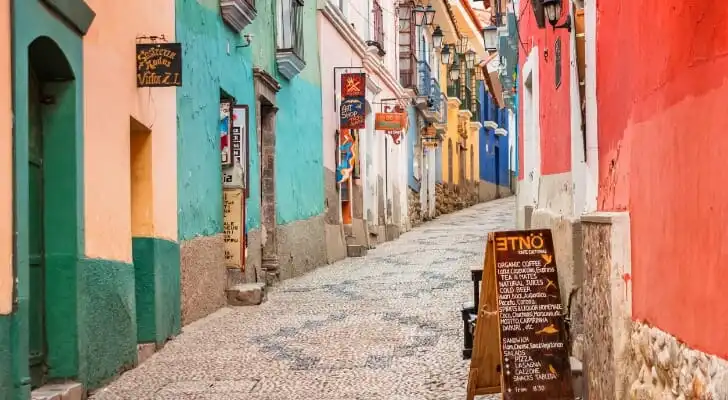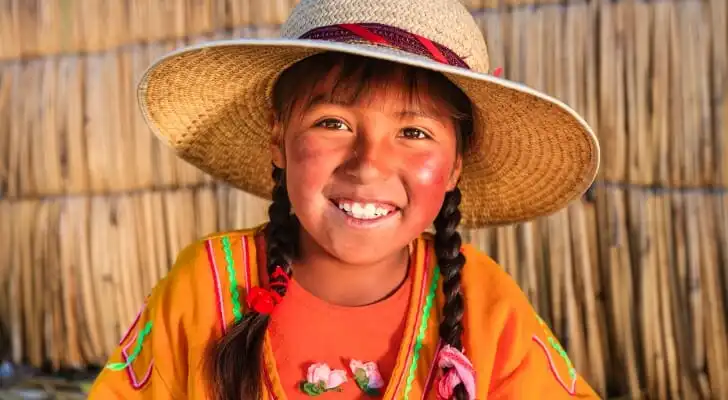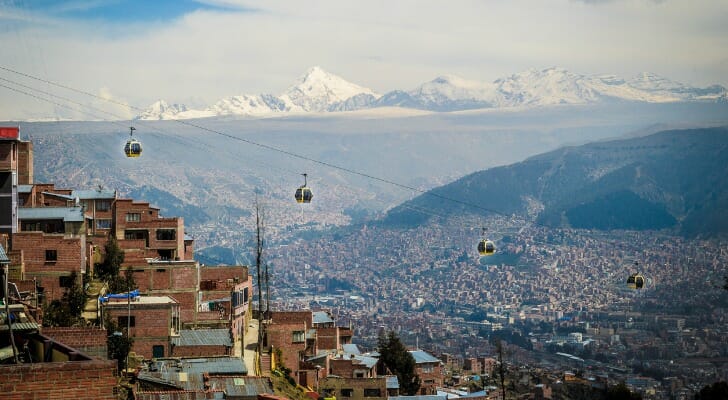 Bolivia is one of South America’s most diverse countries, in both its people and its beautiful, rugged landscapes. The country, which has more than 11 million people, has an array of sights and experiences, unlike anything most travelers will find. Crystal lagoons, lush rainforests and mirror-like salt lakes are just the tip of the iceberg, not to mention the various indigenous cultures which bring Bolivia to life. For the soon-to-be retiree, the low costs of living and beautiful sights are a notable draw. If you are considering how to make this country your new home, speak to a financial advisor who can help you navigate the process of how to retire in Bolivia.
Bolivia is one of South America’s most diverse countries, in both its people and its beautiful, rugged landscapes. The country, which has more than 11 million people, has an array of sights and experiences, unlike anything most travelers will find. Crystal lagoons, lush rainforests and mirror-like salt lakes are just the tip of the iceberg, not to mention the various indigenous cultures which bring Bolivia to life. For the soon-to-be retiree, the low costs of living and beautiful sights are a notable draw. If you are considering how to make this country your new home, speak to a financial advisor who can help you navigate the process of how to retire in Bolivia.
Cost of Living and Housing
In comparison to the U.S., Bolivia’s low cost of living is one of its most attractive features to future retirees. According to Numbeo, a cost-of-living database, you’ll find that the average amount to cover basic, necessary expenses is 49.69% lower than in the U.S. This approximate does not account for rent, but even then, Bolivia’s rent is 73.56% lower as well on average.
Even the country’s two capital cities, La Paz and Santa Cruz, reflect these lower rates. Generally, renting a one-bedroom apartment in either city center is more than affordable, at an average of $353.61 and $415.37, respectively. La Paz sits at a population of around 1.88 million, and Santa Cruz is around the same at a rounded 1.75 million. A similarly populated U.S. city is Phoenix, Arizona, estimated at 1.7 million.
When comparing the cost difference between Phoenix and Bolivia’s two capitals, Bolivia still comes out with the lower average cost. Renting a one-bedroom apartment in the U.S. city will cost about $1,279.82. This price difference also applies to buying as well. Purchasing an apartment in the same location can run around $3,300.75 per square meter, whereas one of the same size in La Paz goes for about $1,173.30 per square meter.
Retire in Bolivia – Visas and Residence Permit
A tourist visas is a requirement for U.S. citizens, according to the U.S. Department of State You can obtain a tourist visa from a U.S. or neighboring country based Bolivian Embassy or Consulate. Alternatively, you can also purchase the it at any air or land border. This visa can then grant you entry for 30 days. If you want to continue your stay, you apply for an extension through Administración Nacional de Migración (National Migration Service).
However, there is no formal retiree visa. Instead, you’ll have to apply for a specific purpose visa as a prelude to a permanent or definitive resident visa. The specific purpose visa will require a background check, proof of income (around $300/month minimum) if you are not working, among other documentation, and a fee of approximately $357. To then get the permanent resident or definitive visa, you’ll have to reside in Bolivia for two years with the correct permissions. You’ll have to prove you’ve stayed the duration and not left the country for more than 90 days. Finally, the cost of this visa will come out to around $560.
Retire in Bolivia – Healthcare
 Bolivia is improving its healthcare system, which one source ranked as No. 126 out of 190 national healthcare systems. In 2019, Evo Morales, Bolivia’s president at the time, rolled out the Unified Health System (SUS), which covers at least 70% of the country’s population with healthcare. The free healthcare system also prioritized addressing its rural and vulnerable communities’ health concerns. They increased the number of available facilities as well as implemented new technology to better support access to medical services.
Bolivia is improving its healthcare system, which one source ranked as No. 126 out of 190 national healthcare systems. In 2019, Evo Morales, Bolivia’s president at the time, rolled out the Unified Health System (SUS), which covers at least 70% of the country’s population with healthcare. The free healthcare system also prioritized addressing its rural and vulnerable communities’ health concerns. They increased the number of available facilities as well as implemented new technology to better support access to medical services.
However, this government program has not been adequately funded, and as a result many facilities are running understaffed and short of supplies. Because these issues affect rural areas to a greater degree, expats should look to receive care from private clinics in major cities if needed. Even then, if you need surgery or treatment for a major condition, it’s wise that you pursue care outside the country. Expatriates often pursue private health insurance as well to cover the costs of care.
Retire in Bolivia – Taxes
Bolivia taxes the income of both its residents and non-residents at a flat rate of 13%. Non-residents only pay this on income earned from Bolivian sources whereas residents have to pay this on their worldwide incomes.
Expatriates will also find that they have to make Social Security contributions in Bolivia. If certain conditions obtain, you can transfer the contributions to your home country.
It’s important to consider that, despite having a residency in Bolivia (or any other country), every U.S. citizen has to file his or her annual tax returns. Income earned in Bolivia may be subject to tax, so it’s best to work with your personal accountant or another financial professional to help you navigate the process while abroad.
Retire in Bolivia – Safety
According to the U.S. Department of State, safety concerns for the foreign expatriate visiting or moving to Bolivia are broken down into three main categories: theft, traveling alone and demonstrations. To avoid these concerns, it’s crucial to stay up-to-date on local events and inform yourself about the areas you intend to visit. You should also exercise a normal amount of caution to tell you what is unsafe, just like you would in any new location.
When you travel alone, you may leave yourself open to pickpocketing, robbery or schemes meant to fool you. You want to ensure you avoid areas like Coronilla Hill in Cochabamba, locations where protesting is happening, and use caution on public transportation. So, plan your routes ahead of schedule and account for who you’ll be traveling with at the time. Or, at least, prioritize traveling during the daytime at busy hours.
The Takeaway
 Bolivia is a South American country on the rise, working to better its infrastructure. The low cost of living may be enough to convince you that Bolivia is the right country for you to retire in. However, life for a U.S. expat is probably most compatible with Bolivia’s most populated cities. But, some retirees may not desire this setting. Additionally, the possibility of having to go out of the country for medical attention may be difficult if you have a pre-existing condition or even an unprecedented health concern.
Bolivia is a South American country on the rise, working to better its infrastructure. The low cost of living may be enough to convince you that Bolivia is the right country for you to retire in. However, life for a U.S. expat is probably most compatible with Bolivia’s most populated cities. But, some retirees may not desire this setting. Additionally, the possibility of having to go out of the country for medical attention may be difficult if you have a pre-existing condition or even an unprecedented health concern.
Tips on Affording Retirement
- Finding a financial advisor that matches your needs doesn’t have to be a challenge. SmartAsset’s free tool connects you with financial advisors in your area in as little as 5 minutes. If you’re ready to speak with the financial advisor that will help you achieve your retirement goals, get started now.
- While Bolivia may have a low cost of living, there are other financial responsibilities on an expatriate retiree’s plate. To get an idea of what to expect, stop by our retirement calculator. To use this, you’ll need to put in a few details about where and when you want to retire and how much you have in savings.
Photo credit: ©iStock.com/benedek, ©iStock.com/hadynyah, ©iStock.com/Jessica Ellig